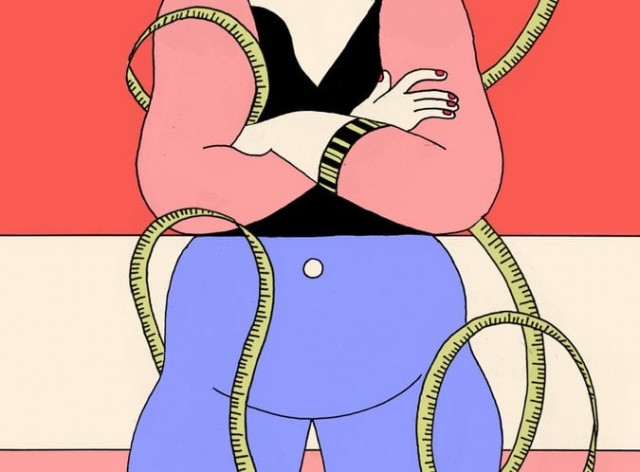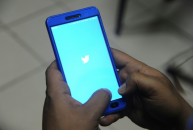Yes, I’m fat. It’s ok I said it.
'Americans are obsessed with obesity, yet actual fat people are largely absent from our cultural landscape'

PHOTO: ANNA DEFLORIAN
A woman at a book club meeting asked me this question recently. I’d been beamed into a living room via Skype to chat about my novel with a group of professional women who drank wine and ate snacks as they awaited my response. Knowing my face was displayed on a huge flat-screen monitor, I smiled to hide my dread, then answered her and the rest of the group on autopilot.
Apple-shaped women more prone to binge eating
I have been asked about my use of the F-word many times by readers and journalists. Sometimes they stumble over the word, as it catches in their throats.
Most people are startled by my unapologetic use of “fat” to describe not only the heroine of my novel, but my own body. To a majority of people, fat can never be anything but an insult. So I’ve explained again and again that fat activists use the word proudly in an effort to destigmatise not only the word, but by extension, the fat body.
I was gung-ho to have these conversations at first. But now I can’t deny that I’ve grown disillusioned. After months of witnessing so much anxiety over a harmless three-letter adjective, it’s become clear that fat — not just the word, but fatness itself — is apparently so horrible it is unspeakable.
Last month, Mattel introduced a new “curvy” Barbie — “curvy” being the only flattering euphemism for a woman who’s “a little bit fat”; “fat Barbie” obviously would have been the kiss of death. In a Time magazine cover story on the doll, little girls testing the toy at the company’s headquarters laughed among themselves about the fatter Barbie. This new Barbie is really just a doll-like approximation of an average woman’s size, but seems large compared with the unrealistic proportions of original Barbie. The girls viewed the new doll as fat, but hesitated to use this word in front of adults. One girl would only spell it out, “F-A-T,” the way one does with other bad words. “I don’t want to hurt her feelings,” she said.
Use your smartphone to reduce weight gain
Americans are obsessed with obesity, yet actual fat people are largely absent from our cultural landscape. With few exceptions, most of the fat people we do see in the media and pop culture hate their bodies, from the contestants paraded around like circus animals on “The Biggest Loser” to celebrities who flog themselves in nationally televised weight-loss commercials. Americans expect and enjoy the spectacle of the miserable fat person, so to challenge this narrative is a radical act.
Talking with people about my book taught me that we might think we live in an age when we can’t be shocked, but a novel about a 300-pound woman who learns to love her body as it is — without losing weight — is a major taboo. Since I dared not only to write this story, but also to appear in public as a fat woman myself, refusing to apolosize for my existence or to hide my body in a burlap sack, I became an unwitting ambassador for the revolutionary idea that there’s nothing wrong with being fat and female. I get asked questions more appropriate for a therapist or a nutritionist than a novelist. I get asked about my history of dieting and body image struggles. I am harassed by a mob of online trolls dedicated to bullying fat women.
A few months after the book was published in the United States, I went on a book tour in Australia. During a live radio interview on my first day there, another novelist, Will Self, hijacked the discussion of my book to lecture me about how unhealthy and ugly fat people are; to cite the Holocaust to make a point about the correlation between body size, exercise and food consumption (“You never saw anybody fat come out of Auschwitz,” he said, quoting a drug counselor); and to spread fear about a looming fat apocalypse, claiming that, among other things, “statistically, where I live in England, by 2030 nobody will walk.”
On another show I debated an obesity expert, and on yet another I handled call-in questions from listeners about whether it’s O.K. to be fat — a debate that followed a discussion of the war in Syria.
Morning light exposure may lead to weight gain in kids
The last event of my Australian tour was a speech at the Festival of Dangerous Ideas. Onstage at the Sydney Opera House, I began my talk about how it’s O.K. to be fat by sharing an example from my own life. A few years ago, I posted a link on Twitter to a 1969 interview with Jim Morrison, in which he said, “Fat is beautiful.” Minutes after posting the link, a friend responded angrily that being fat is unhealthy because it causes high blood pressure and other health problems. This response, I told the audience, is an example of what I call “Fat Derangement Syndrome,” where even people who consider themselves to be open-minded, critical thinkers become outraged if fat is spoken about in any positive way.
During the audience question-and-answer period, people stood up, one after another, and made negative comments about weight. I felt like a witch surrounded by torch-wielding villagers. It was clear that even for many urban sophisticates paying to attend a festival about difficult ideas, thinking about fat as anything but bad was borderline impossible. As my protagonist realises in the novel, a person can never simply be fat; a fat body always needs to be fixed.
Backstage, the moderator of the event asked if I was O.K. This wasn’t the first time someone on my tour had pulled me aside to ask that question. I said I was fine, but in the hotel that night, I crawled into bed, relieved that I no longer had to perform as a professional fatty. I wanted to go home and hide. I am ashamed of this response. I wrote a novel to give fat women a voice, but then became exhausted using mine. I had begun to feel like the fat lady in a freak show, on display for public amusement.
The front lines of the obesity debate are an awful place to be for anyone who challenges pervasive “fat is bad” rhetoric and who asserts that the most significant problem for fat people isn’t their bodies, but hatred and abuse from society. One side of the debate includes the multibillion-dollar weight-loss and health care industries and entrenched bigotry. On the other side is a small and relatively powerless group of activists.
Obesity can spread through social networks
At the heart of this debate over obesity is a professed concern for health, as if the dignity of any group should be contingent on whether its members are deemed healthy. But issues of health are not so clear cut, and the Health at Every Size movement offers a legitimate critique of narrowly focused weight-based approaches to health.
Every weekday, get thought-provoking commentary from Op-Ed columnists, The Times editorial board and contributing writers from around the world.
In a culture where most fat people in the media have missing heads — the anonymous, decapitated, interchangeable blobs whose photos accompany scary news stories about obesity — a fat woman with a voice can be threatening, not just to bullies, misogynists and anti-obesity crusaders, but to many of those who consider themselves to be enlightened, too. I sometimes think it would be easier to be one of those anonymous, headless fat people. But if you’re missing a head, you can’t speak up.
This article originally appeared on The New York Times, a partner of The Express Tribune.


















COMMENTS
Comments are moderated and generally will be posted if they are on-topic and not abusive.
For more information, please see our Comments FAQ